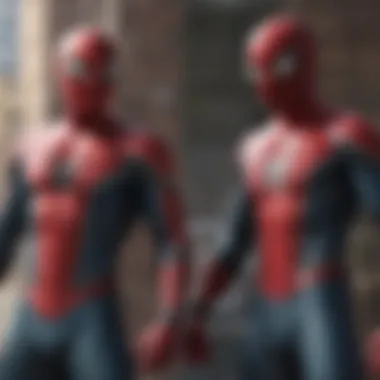Unveiling the Evolution of Spider-Man in Film: A Comprehensive Analysis


Spider-Man Character Analysis
Spider-Man, a beloved superhero of Marvel Comics, has captured the hearts of audiences worldwide with his unique blend of relatable persona and extraordinary powers. Over the years, Spider-Man’s character has evolved from humble beginnings to become a symbol of courage and responsibility. From the iconic rendition by Tobey Maguire to the refreshing take by Tom Holland, each portrayal brings a different facet of the web-slinger to life.
Background:
Spider-Man, also known as Peter Parker, was created by writer Stan Lee and artist Steve Ditko in the early 1960s. The character made his debut in 'Amazing Fantasy #15,' showcasing the story of a young, nerdy high school student who gains incredible spider-like abilities after being bitten by a radioactive spider. This origin story laid the foundation for Spider-Man's journey as a hero torn between the demands of his personal life and the responsibilities of being a crime-fighter.
Powers and Abilities:
Spider-Man's powers are a result of the spider bite and include superhuman strength, agility, and reflexes. His ability to climb walls and shoot webs from his wrists adds a dynamic element to his crime-fighting style. Beyond physical attributes, Peter Parker's sharp intellect and quick thinking are crucial in outsmarting foes and saving the day.
Character Development:
Throughout the various movie adaptations, Spider-Man's character undergoes significant growth and development. From learning the hard lessons of power and responsibility to grappling with losses and sacrifices, each iteration of Spider-Man delves deeper into the moral complexities of being a hero. The evolution of Peter Parker's character highlights themes of sacrifice, loyalty, and the enduring struggle to do what is right in the face of adversity.
Introduction to Spider-Man Films
In this detailed exploration of Spider-Man films, we unlock the captivating evolution of everyone's beloved web-slinging hero on the silver screen. The significance of delving into the realm of Spider-Man movies lies in examining how the character has transformed over the years and enamored audiences globally with each iteration. From Tobey Maguire's iconic portrayal to the fresh take by Tom Holland, this section offers a comprehensive overview of the cinematic journey of Spider-Man.
Evolution of Spider-Man on Screen
The Tobey Maguire Era
In scrutinizing the portrayal of Spider-Man by Tobey Maguire, one cannot overlook the profound impact it had on shaping the superhero genre. Maguire's embodiment of the character brought depth and relatability, resonating with viewers on a more human level. The key characteristic that distinguishes the Tobey Maguire Era is its ability to infuse vulnerability and emotional complexity into the superhero narrative, a departure from the traditional invincible hero archetype common in the genre. This introspective approach endeared Maguire's Spider-Man to audiences and set a precedent for future character interpretations.
The Andrew Garfield Interpretation
The Andrew Garfield Interpretation of Spider-Man offered a more contemporary and edgier take on the superhero. Garfield's portrayal highlighted a youthful energy and wit that appealed to a newer generation of fans. A key characteristic of this interpretation is its focus on the modern complexities of being a teenage superhero, grappling with personal relationships and self-identity amidst the heroics. The unique feature of The Andrew Garfield Interpretation lies in its emphasis on the emotional turmoil and growth of the character, adding layers of depth to Spider-Man's persona.
The Tom Holland Revamp
With The Tom Holland Revamp, Spider-Man underwent a rejuvenation that breathed new life into the character. Holland's portrayal brought a youthfulness and humor that resonated with audiences of all ages. The key characteristic of The Tom Holland Revamp is its seamless integration into the Marvel Cinematic Universe, enriching Spider-Man's story with interconnected narratives and collaborations with other iconic superheroes. The unique feature of this revamp is its ability to balance the challenges of being a hero with the everyday struggles of adolescence, creating a compelling and dynamic portrayal of Spider-Man.
Impact of Spider-Man Movies
Cultural Influence


The Spider-Man movies have left an indelible mark on popular culture, influencing fashion, language, and societal norms. One key characteristic of their cultural influence is the universal themes of heroism, sacrifice, and responsibility that resonate across diverse audiences. The unique feature of this impact lies in Spider-Man's ability to transcend boundaries of age, gender, and nationality, making him a symbol of hope and inspiration worldwide. While the advantage of such influence is the enduring relevance of Spider-Man in contemporary discourse, a potential disadvantage could be the immense pressure to continually live up to audience expectations.
Box Office Success
Spider-Man movies have consistently proven their box office prowess, breaking records and fueling the economy of the film industry. The key characteristic of their success lies in the mass appeal of the superhero, drawing both hardcore fans and casual viewers to theaters worldwide. The unique feature of this success is Spider-Man's ability to maintain box office dominance even amidst a saturated market of superheroes, showcasing the enduring popularity and financial viability of the character. While the advantage of such success is the financial stability it provides the franchise, a potential disadvantage could be the tendency to prioritize profit over creative innovation.
Merchandising Power
The merchandising power of Spider-Man films has revolutionized the way in which movies translate into consumer products and brand partnerships. A key characteristic of this power is the diversity of merchandise available, ranging from action figures to clothing lines, catering to a wide range of consumer preferences. The unique feature of Spider-Man's merchandising success lies in the longevity of the brand, with merchandise continuing to be sought after years after a movie's release. While the advantage of such power is the opportunity for fans to engage with the franchise beyond the screen, a potential disadvantage could be the oversaturation of the market with Spider-Man products, diluting the exclusivity of certain items.
The Latest Installments
In the realm of Spider-Man movies, 'The Latest Installments' stand out as a pivotal topic. This section delves into the most recent additions to the Spider-Man saga, providing a comprehensive insight into the ongoing evolution of the beloved superhero on the big screen. From 'Spider-Man: Homecoming' to 'Spider-Man: Far From Home' and the upcoming 'Spider-Man: No Way Home,' these installments hold immense significance in shaping the narrative of the web-slinger in today's cinematic landscape. By exploring the latest developments and story arcs, audiences gain a deeper appreciation for the multi-faceted character of Spider-Man and his enduring appeal.
Spider-Man: Homecoming
Plot Overview
The 'Plot Overview' of 'Spider-Man: Homecoming' serves as a crucial element in understanding the narrative trajectory of this installment. This section meticulously dissects the storyline, highlighting key events and character developments that drive the plot forward. The plot of 'Spider-Man: Homecoming' intricately weaves together Peter Parker's personal struggles as a high school student with his newfound responsibilities as a superhero. This juxtaposition not only adds depth to Peter's character but also propels the overarching theme of facing challenges and embracing one's true self. The unique feature of the plot lies in its ability to blend poignant moments of self-discovery with adrenaline-pumping superhero action, creating a compelling and relatable story for viewers of all ages.
Cast and Characters
The 'Cast and Characters' of 'Spider-Man: Homecoming' play a vital role in bringing the narrative to life. Each character is meticulously crafted to resonate with the audience, from Tom Holland's portrayal of Peter Parker to Michael Keaton's menacing performance as the Vulture. The cast not only elevates the storytelling but also adds layers of complexity to the relationships within the Spider-Man universe. The chemistry between the characters breathes authenticity into the narrative, making the emotional moments more poignant and the action sequences more exhilarating. This attention to character detail sets 'Spider-Man: Homecoming' apart as a standout installment in the Spider-Man franchise.
Critical Reception
The 'Critical Reception' of 'Spider-Man: Homecoming' serves as a barometer of the film's impact on audiences and critics alike. The movie was widely praised for its fresh take on the superhero genre, offering a coming-of-age story intertwined with blockbuster spectacle. Critics lauded the performances, particularly Holland's portrayal of a youthful and inexperienced Spider-Man navigating the complexities of superhero life. The film's ability to blend humor, heart, and heroism struck a chord with viewers, solidifying its position as a beloved addition to the Spider-Man canon. While some critics highlighted pacing issues, the overall consensus was overwhelmingly positive, cementing 'Spider-Man: Homecoming' as a fan favorite among Spider-Man enthusiasts.
Spider-Man: Far From Home
Exploring the Multiverse
The 'Exploring the Multiverse' aspect of 'Spider-Man: Far From Home' introduces a new dimension to the Spider-Man universe. By delving into the concept of parallel realities and alternate timelines, the film expands the narrative canvas and opens up limitless storytelling possibilities. This thematic exploration not only enriches the overall plot but also deepens the audience's engagement with Spider-Man as a character navigating through a multiverse of challenges and choices. The unique feature of this exploration lies in its ability to blend science fiction elements with the grounded emotional core of Peter Parker, offering a viewing experience that is both intellectually stimulating and emotionally resonant.
Villains and Antagonists
The 'Villains and Antagonists' in 'Spider-Man: Far From Home' play a pivotal role in testing Spider-Man's strength and resolve. From the enigmatic Mysterio to the sinister Elementals, the villains in this installment pose a formidable challenge to our hero, pushing him to his limits both physically and emotionally. Each antagonist is meticulously crafted to embody a specific threat, reflecting different facets of Peter Parker's inner struggles and fears. This intricate web of conflicts not only raises the stakes for Spider-Man but also showcases the depth and diversity of adversaries within the Spider-Man universe.


Easter Eggs and References
'Easter Eggs and References' in 'Spider-Man: Far From Home' add a layer of depth and nostalgia for dedicated fans of the franchise. Through subtle nods to comic book lore, previous films, and wider superhero mythos, the movie rewards attentive viewers with hidden gems and clever callbacks. These intricately placed easter eggs not only pay homage to the rich history of Spider-Man but also tease potential future storylines and character arcs. The meticulous attention to detail in incorporating these references enhances the viewing experience, making 'Spider-Man: Far From Home' a treasure trove of surprises for eagle-eyed fans.
Upcoming Projects
Spider-Man: No Way Home
The anticipation surrounding 'Spider-Man: No Way Home' is palpable, with fans eagerly awaiting the next chapter in the web-slinger's cinematic journey. This installment promises to delve deeper into the themes of identity, sacrifice, and redemption, exploring new facets of Peter Parker's character while navigating the consequences of his actions. The key characteristic of 'Spider-Man: No Way Home' lies in its ambitious storytelling, uniting past and present elements of the Spider-Man mythos in a cohesive and engaging narrative. With rumored appearances from past villains and superheroes, the film is poised to deliver a thrilling cinematic experience that pays tribute to Spider-Man's enduring legacy.
Spin-off Films and TV Series
The 'Spin-off Films and TV Series' associated with the Spider-Man franchise offer exciting opportunities to explore supporting characters and alternative storylines. By expanding the Spider-Man universe beyond the core films, these projects delve deeper into the lives and adventures of characters like Venom, Morbius, and Silk. The key characteristic of these spin-offs lies in their ability to enrich the overarching narrative of Spider-Man, providing new perspectives and dimensions to familiar characters. Through unique storytelling techniques and distinct visual styles, these projects offer fresh and compelling interpretations of the Spider-Man mythos, catering to a diverse range of audience preferences.
Future Collaborations
'Future Collaborations' present a myriad of possibilities for the Spider-Man franchise, from potential team-ups with other superheroes to crossover events with different cinematic universes. By forging alliances with other studios and creatives, the Spider-Man series can explore new horizons and push the boundaries of traditional superhero storytelling. The key characteristic of these collaborations lies in their ability to break down barriers between franchises, creating rich tapestries of interconnected narratives that captivate and excite audiences. Through strategic partnerships and bold creative choices, future collaborations promise to redefine the superhero genre while honoring the timeless legacy of Spider-Man.
Behind the Scenes
Behind the Scenes is a pivotal element in dissecting the intricate world of Spider-Man movies. It offers a unique perspective into the creation process, shedding light on the visionary efforts that culminate in the on-screen magic. This section delves into the creative minds and technical intricacies that bring Spider-Man to life on the big screen. From directorial decisions to special effects, Behind the Scenes uncovers the hidden artistry that captivates audiences worldwide.
Sam Raimi's Influence
Sam Raimi's Influence within the Spider-Man franchise has been profound, shaping the character's cinematic journey in unparalleled ways. Raimi's distinct directorial style, marked by dynamic storytelling and visual flair, resonates throughout the Spider-Man films he helmed. His keen eye for blending action with emotion and character development set a benchmark for superhero storytelling, influencing future adaptations in the genre. While his style may polarize critics, there's no denying the impact of Raimi's Influence on Spider-Man's on-screen legacy.
Jon Watts' Approach
Jon Watts' Approach brings a fresh perspective to the Spider-Man universe, infusing the films with contemporary sensibilities and nuanced character portrayals. Watts' emphasis on youthful energy and relatable conflicts adds depth to Peter Parker's coming-of-age arc, resonating with audiences on a personal level. His ability to balance humor with heart-wrenching moments creates a tonal richness that distinguishes his approach from predecessors. While facing challenges in adapting such an iconic character, Watts' Approach succeeds in modernizing Spider-Man for a new generation.
Unique Filmmaking Styles
Unveiling Unique Filmmaking Styles in Spider-Man movies showcases the diversity of artistic interpretation within the franchise. From gritty realism to fantastical elements, each director infuses their signature style into the storytelling canvas, offering viewers a spectrum of visual experiences. Whether through innovative camera techniques or unconventional narrative structures, these styles shape the aesthetic landscape of Spider-Man films, pushing boundaries and redefining genre conventions. While not every style may resonate with all viewers, the diversity of approaches contributes to the richness and dynamism of the Spider-Man cinematic universe.
Special Effects and Technology
Special Effects and Technology play an indispensable role in shaping the grandeur and spectacle of Spider-Man movies. This section explores the technological advancements and creative innovations that elevate the superhero narrative to new heights, captivating audiences with jaw-dropping visuals and seamless world-building.


CGI Advancements
The realm of CGI Advancements has revolutionized the depiction of superhuman abilities and otherworldly landscapes in Spider-Man films. From web-swinging acrobatics to epic battle sequences, CGI breathes life into Spidey's adventures, blurring the lines between reality and fantasy. The evolution of CGI technology allows for intricate details and fluid movements, enhancing the immersive experience for viewers. While some purists may critique the overreliance on CGI, its transformative impact on Spider-Man movies cannot be understated.
Costume Design Innovations
Costume Design Innovations in Spider-Man movies are integral to capturing the essence of the iconic arachnid hero. The evolution of Spidey's suits reflects advancements in materials, aesthetics, and functionality, enhancing both form and function. From the classic red-and-blue ensemble to sleek futuristic designs, each iteration of the Spider-Man costume tells a visual story, embodying the character's evolution and adaptability. Costume designers play a crucial role in balancing tradition with innovation, ensuring that each suit resonates authentically with fans while pushing creative boundaries.
Stunt Coordination
Stunt Coordination is the backbone of high-octane action sequences that define Spider-Man movies. Behind every gravity-defying leap and adrenaline-pumping fight scene lies meticulous planning and execution by skilled stunt teams. The seamless integration of practical stunts with visual effects creates a visceral impact, immersing audiences in Spider-Man's daredevil exploits. Stunt coordinators collaborate closely with directors and actors to ensure safety and authenticity, pushing the boundaries of what is cinematically possible. While the risks are inherent in such feats, the meticulous attention to detail in stunt coordination elevates the action sequences to unforgettable cinematic moments.
Fan Theories and Speculations
Fan theories and speculations play a pivotal role in the realm of Spider-Man movies. They add an extra layer of excitement and engagement for fans who love to dissect and analyze every detail of the cinematic universe. By delving into fan theories, audiences can unravel hidden clues, predict future plot developments, and connect dots that may have gone unnoticed. This section will explore the intriguing world of fan theories and speculations, shedding light on how these theories contribute to the overall Spider-Man film experience.
The Multiverse Conundrum
Connections to MCU
When delving into the Connections to Marvel Cinematic Universe (MCU), one discovers a web of intricate links that enrich the narrative tapestry of Spider-Man films. These connections serve as a bridge between different storylines, introducing familiar characters and story arcs from the broader MCU. By intertwining the Spider-Man universe with the MCU, filmmakers can tap into a vast reservoir of established lore, creating a cohesive and immersive experience for loyal fans. However, balancing these connections requires finesse to ensure coherence without overwhelming the central narrative of Spider-Man.
Possible Crossovers
The concept of Possible Crossovers opens up a realm of possibilities for Spider-Man stories. It allows for character interactions, team-ups, and plot convergences that tantalize audiences with what-ifs and alternate realities. Through potential crossovers with other superheroes or villains from the Marvel universe, Spider-Man movies can explore dynamic dynamics and fresh narratives that transcend individual storylines. However, careful execution is paramount to avoid diluting the essence of Spider-Man's story and core themes amidst cross-dimensional exploits.
Foreshadowing Events
Foreshadowing events in Spider-Man movies serve as breadcrumbs for attentive viewers, hinting at future developments and narrative twists. These subtle hints and clues planted throughout the film lay the groundwork for future plot revelations, creating anticipation and speculation among fans. By skillfully incorporating foreshadowing events, filmmakers can build tension, deepen character arcs, and deliver satisfying payoffs that resonate with audiences. However, striking a balance between foreshadowing and surprise is crucial to maintaining engagement and avoiding predictability in storytelling.
Character Arcs and Development
Peter Parker's Journey
Peter Parker's journey in the Spider-Man films encapsulates the essence of growth, resilience, and self-discovery. His evolution from a humble teenager to a seasoned superhero resonates with audiences on a deeply human level, showcasing the complexities of heroism and sacrifice. By tracing Peter's struggles, triumphs, and moral dilemmas, viewers gain insight into the inner workings of a beloved character navigating the challenges of dual identities and responsibility. However, depicting Peter's journey authentically requires nuanced storytelling and character development to convey his emotional depth and internal conflicts effectively.
Supporting Characters' Impact
The impact of supporting characters in Spider-Man movies extends beyond mere side roles, shaping Peter Parker's worldview, decisions, and personal growth. These characters serve as pillars of strength, sources of wisdom, and catalysts for pivotal moments in Peter's life as Spider-Man. Through their interactions and relationships with Peter, supporting characters add layers of emotional depth, humor, and camaraderie that enhance the overall narrative experience. However, striking a balance between spotlighting supporting characters and maintaining Peter as the central focus is essential to avoid diluting his character arc and story progression.
Anticipated Plot Twists
Anticipated plot twists in Spider-Man movies ignite speculation, debate, and intrigue among fans eagerly awaiting unforeseen turns in the narrative. These twists challenge conventional storytelling norms, subverting expectations and introducing compelling twists that redefine character dynamics and plot trajectories. By incorporating well-crafted plot twists, filmmakers can elevate the stakes, inject suspense, and keep audiences on the edge of their seats throughout the cinematic journey. However, executing plot twists effectively requires meticulous planning, subtle foreshadowing, and narrative coherence to ensure audience investment and satisfaction with the unexpected revelations.







